Samsung's Bribery Charges and Corporate Governance: A Business Report
VerifiedAdded on 2023/01/12
|11
|3664
|76
AI Summary
This business report discusses Samsung's bribery charges and corporate governance, including director's contracts, remuneration, role of chairman, and committee structure. It also explores normative and descriptive theories of business ethics and examines internal and external stakeholders' ethical practices.
Contribute Materials
Your contribution can guide someone’s learning journey. Share your
documents today.

Business
Report
Report
Secure Best Marks with AI Grader
Need help grading? Try our AI Grader for instant feedback on your assignments.
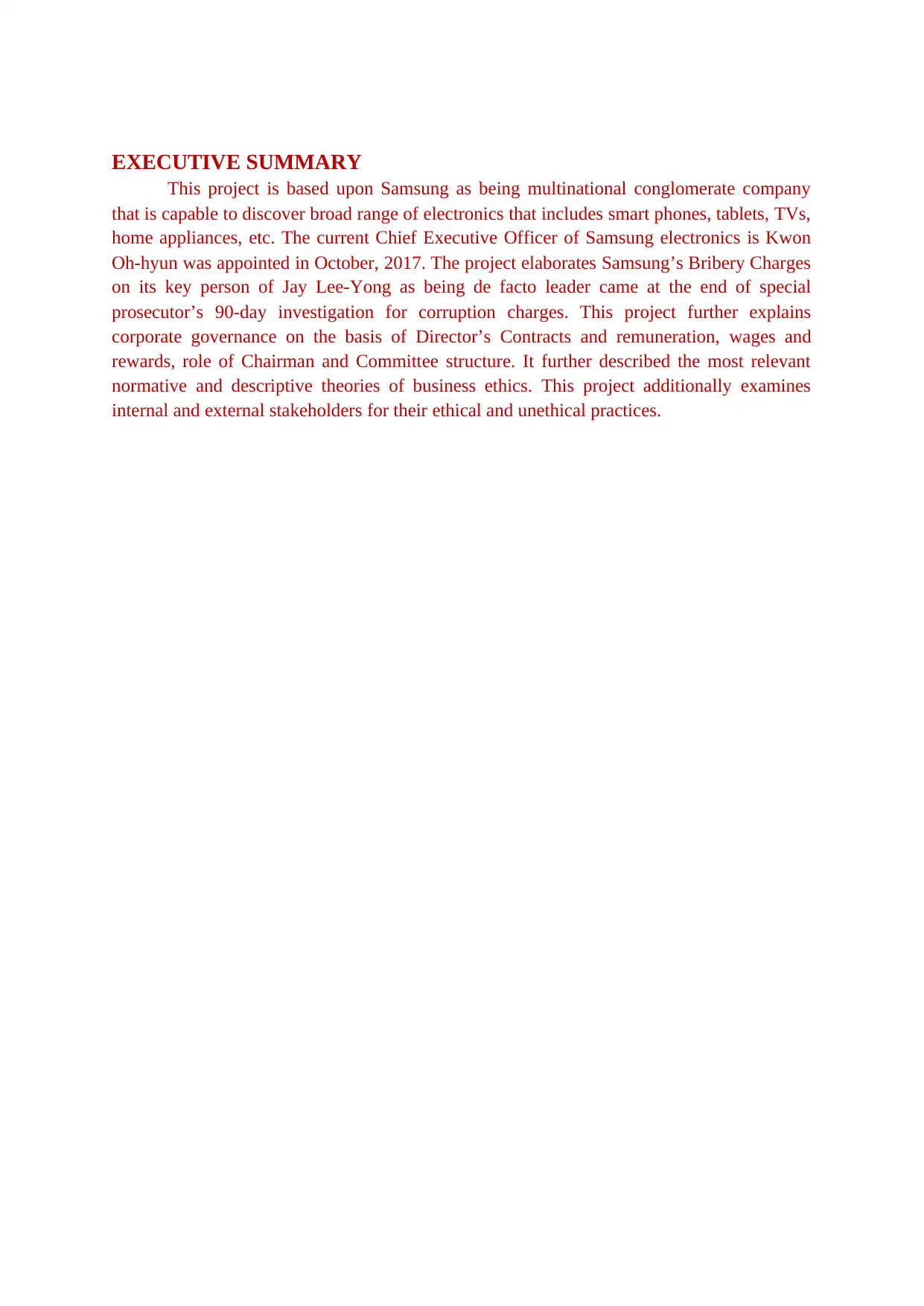
EXECUTIVE SUMMARY
This project is based upon Samsung as being multinational conglomerate company
that is capable to discover broad range of electronics that includes smart phones, tablets, TVs,
home appliances, etc. The current Chief Executive Officer of Samsung electronics is Kwon
Oh-hyun was appointed in October, 2017. The project elaborates Samsung’s Bribery Charges
on its key person of Jay Lee-Yong as being de facto leader came at the end of special
prosecutor’s 90-day investigation for corruption charges. This project further explains
corporate governance on the basis of Director’s Contracts and remuneration, wages and
rewards, role of Chairman and Committee structure. It further described the most relevant
normative and descriptive theories of business ethics. This project additionally examines
internal and external stakeholders for their ethical and unethical practices.
This project is based upon Samsung as being multinational conglomerate company
that is capable to discover broad range of electronics that includes smart phones, tablets, TVs,
home appliances, etc. The current Chief Executive Officer of Samsung electronics is Kwon
Oh-hyun was appointed in October, 2017. The project elaborates Samsung’s Bribery Charges
on its key person of Jay Lee-Yong as being de facto leader came at the end of special
prosecutor’s 90-day investigation for corruption charges. This project further explains
corporate governance on the basis of Director’s Contracts and remuneration, wages and
rewards, role of Chairman and Committee structure. It further described the most relevant
normative and descriptive theories of business ethics. This project additionally examines
internal and external stakeholders for their ethical and unethical practices.

Table of Contents
INTRODUCTION.................................................................................................................................3
PART 1..................................................................................................................................................3
PART 2..................................................................................................................................................4
PART 3..................................................................................................................................................6
CONCLUSION.....................................................................................................................................9
RECOMMENDATIONS.......................................................................................................................9
REFERENCES....................................................................................................................................10
INTRODUCTION.................................................................................................................................3
PART 1..................................................................................................................................................3
PART 2..................................................................................................................................................4
PART 3..................................................................................................................................................6
CONCLUSION.....................................................................................................................................9
RECOMMENDATIONS.......................................................................................................................9
REFERENCES....................................................................................................................................10
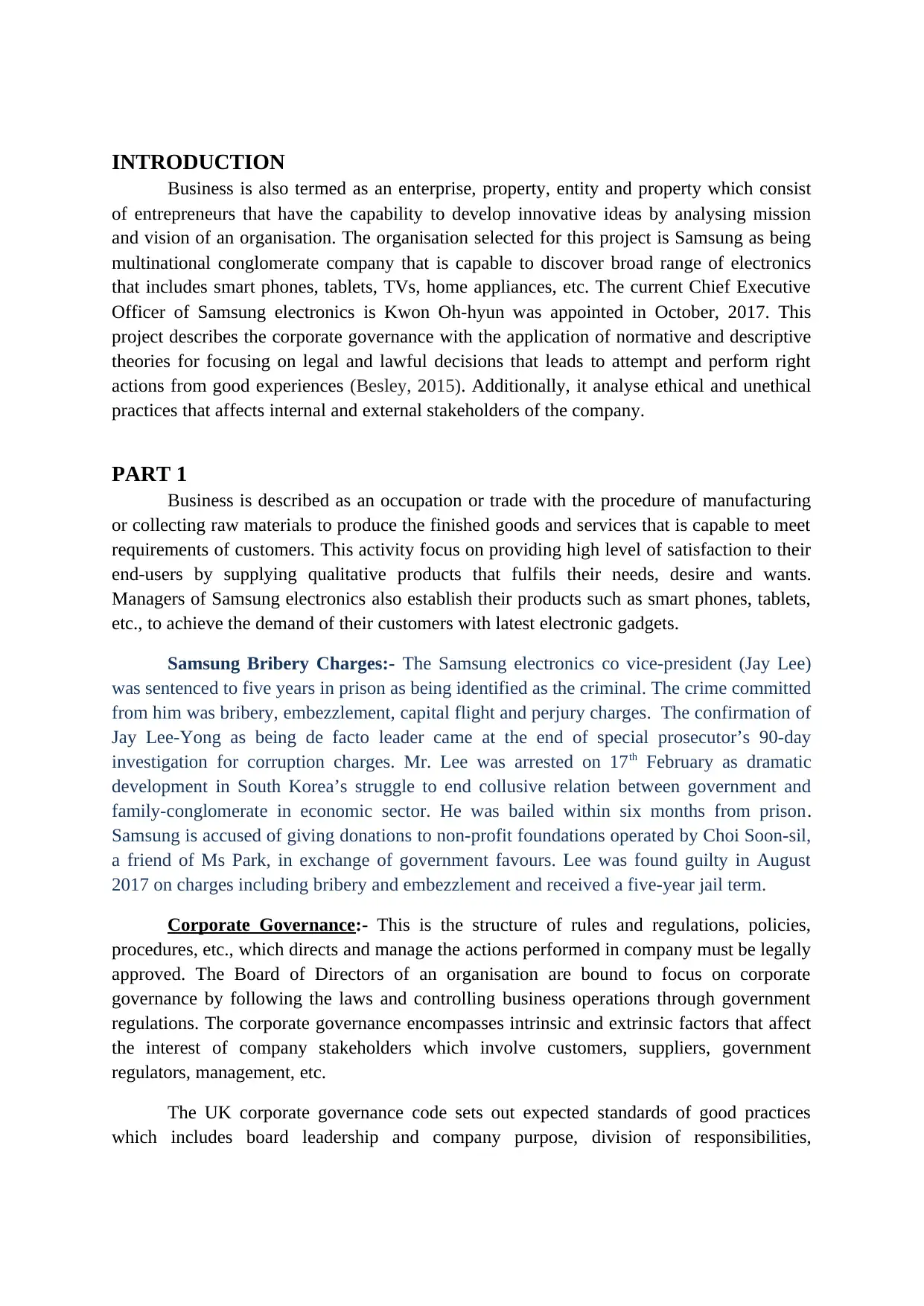
INTRODUCTION
Business is also termed as an enterprise, property, entity and property which consist
of entrepreneurs that have the capability to develop innovative ideas by analysing mission
and vision of an organisation. The organisation selected for this project is Samsung as being
multinational conglomerate company that is capable to discover broad range of electronics
that includes smart phones, tablets, TVs, home appliances, etc. The current Chief Executive
Officer of Samsung electronics is Kwon Oh-hyun was appointed in October, 2017. This
project describes the corporate governance with the application of normative and descriptive
theories for focusing on legal and lawful decisions that leads to attempt and perform right
actions from good experiences (Besley, 2015). Additionally, it analyse ethical and unethical
practices that affects internal and external stakeholders of the company.
PART 1
Business is described as an occupation or trade with the procedure of manufacturing
or collecting raw materials to produce the finished goods and services that is capable to meet
requirements of customers. This activity focus on providing high level of satisfaction to their
end-users by supplying qualitative products that fulfils their needs, desire and wants.
Managers of Samsung electronics also establish their products such as smart phones, tablets,
etc., to achieve the demand of their customers with latest electronic gadgets.
Samsung Bribery Charges:- The Samsung electronics co vice-president (Jay Lee)
was sentenced to five years in prison as being identified as the criminal. The crime committed
from him was bribery, embezzlement, capital flight and perjury charges. The confirmation of
Jay Lee-Yong as being de facto leader came at the end of special prosecutor’s 90-day
investigation for corruption charges. Mr. Lee was arrested on 17th February as dramatic
development in South Korea’s struggle to end collusive relation between government and
family-conglomerate in economic sector. He was bailed within six months from prison.
Samsung is accused of giving donations to non-profit foundations operated by Choi Soon-sil,
a friend of Ms Park, in exchange of government favours. Lee was found guilty in August
2017 on charges including bribery and embezzlement and received a five-year jail term.
Corporate Governance:- This is the structure of rules and regulations, policies,
procedures, etc., which directs and manage the actions performed in company must be legally
approved. The Board of Directors of an organisation are bound to focus on corporate
governance by following the laws and controlling business operations through government
regulations. The corporate governance encompasses intrinsic and extrinsic factors that affect
the interest of company stakeholders which involve customers, suppliers, government
regulators, management, etc.
The UK corporate governance code sets out expected standards of good practices
which includes board leadership and company purpose, division of responsibilities,
Business is also termed as an enterprise, property, entity and property which consist
of entrepreneurs that have the capability to develop innovative ideas by analysing mission
and vision of an organisation. The organisation selected for this project is Samsung as being
multinational conglomerate company that is capable to discover broad range of electronics
that includes smart phones, tablets, TVs, home appliances, etc. The current Chief Executive
Officer of Samsung electronics is Kwon Oh-hyun was appointed in October, 2017. This
project describes the corporate governance with the application of normative and descriptive
theories for focusing on legal and lawful decisions that leads to attempt and perform right
actions from good experiences (Besley, 2015). Additionally, it analyse ethical and unethical
practices that affects internal and external stakeholders of the company.
PART 1
Business is described as an occupation or trade with the procedure of manufacturing
or collecting raw materials to produce the finished goods and services that is capable to meet
requirements of customers. This activity focus on providing high level of satisfaction to their
end-users by supplying qualitative products that fulfils their needs, desire and wants.
Managers of Samsung electronics also establish their products such as smart phones, tablets,
etc., to achieve the demand of their customers with latest electronic gadgets.
Samsung Bribery Charges:- The Samsung electronics co vice-president (Jay Lee)
was sentenced to five years in prison as being identified as the criminal. The crime committed
from him was bribery, embezzlement, capital flight and perjury charges. The confirmation of
Jay Lee-Yong as being de facto leader came at the end of special prosecutor’s 90-day
investigation for corruption charges. Mr. Lee was arrested on 17th February as dramatic
development in South Korea’s struggle to end collusive relation between government and
family-conglomerate in economic sector. He was bailed within six months from prison.
Samsung is accused of giving donations to non-profit foundations operated by Choi Soon-sil,
a friend of Ms Park, in exchange of government favours. Lee was found guilty in August
2017 on charges including bribery and embezzlement and received a five-year jail term.
Corporate Governance:- This is the structure of rules and regulations, policies,
procedures, etc., which directs and manage the actions performed in company must be legally
approved. The Board of Directors of an organisation are bound to focus on corporate
governance by following the laws and controlling business operations through government
regulations. The corporate governance encompasses intrinsic and extrinsic factors that affect
the interest of company stakeholders which involve customers, suppliers, government
regulators, management, etc.
The UK corporate governance code sets out expected standards of good practices
which includes board leadership and company purpose, division of responsibilities,
Secure Best Marks with AI Grader
Need help grading? Try our AI Grader for instant feedback on your assignments.
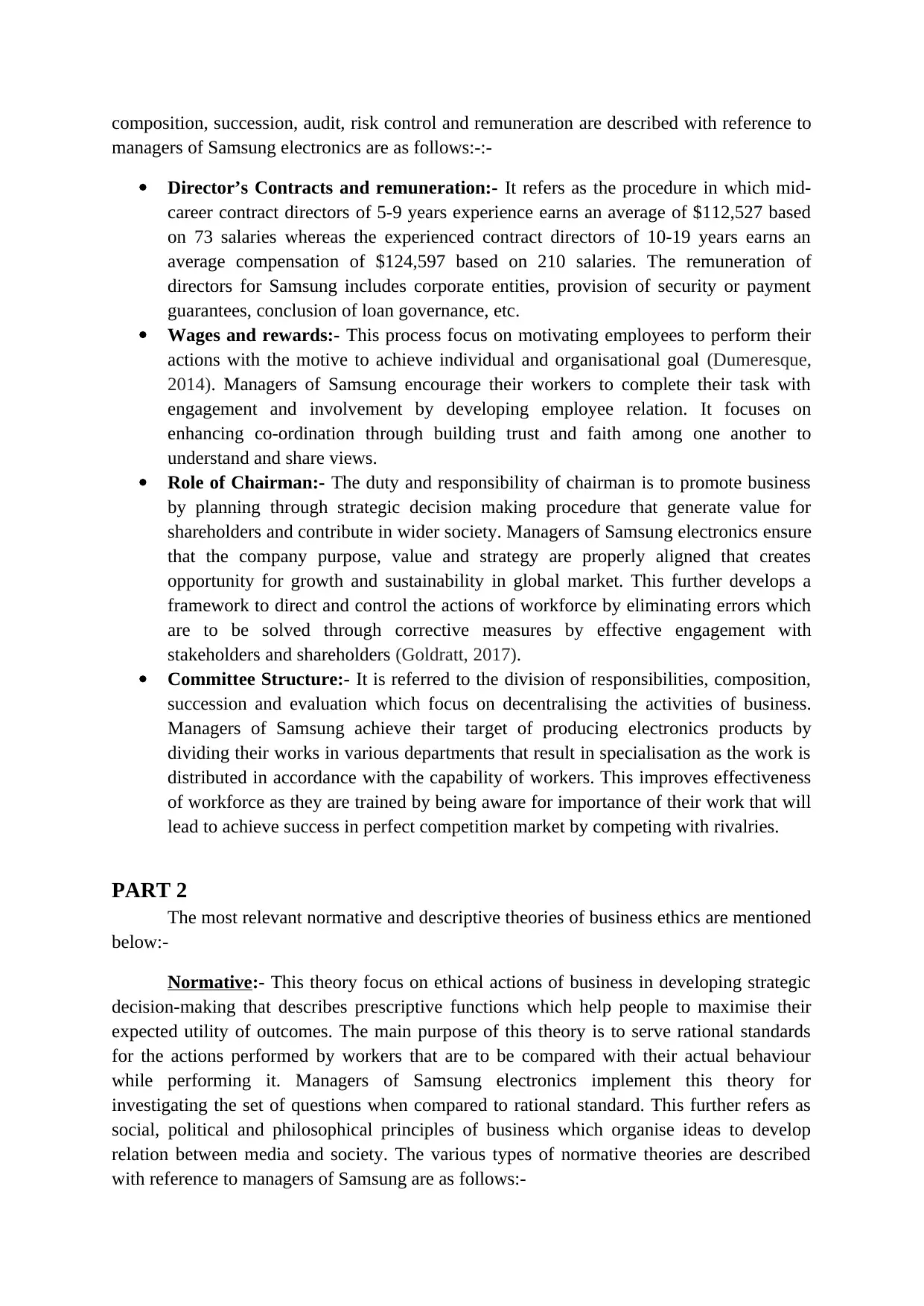
composition, succession, audit, risk control and remuneration are described with reference to
managers of Samsung electronics are as follows:-:-
Director’s Contracts and remuneration:- It refers as the procedure in which mid-
career contract directors of 5-9 years experience earns an average of $112,527 based
on 73 salaries whereas the experienced contract directors of 10-19 years earns an
average compensation of $124,597 based on 210 salaries. The remuneration of
directors for Samsung includes corporate entities, provision of security or payment
guarantees, conclusion of loan governance, etc.
Wages and rewards:- This process focus on motivating employees to perform their
actions with the motive to achieve individual and organisational goal (Dumeresque,
2014). Managers of Samsung encourage their workers to complete their task with
engagement and involvement by developing employee relation. It focuses on
enhancing co-ordination through building trust and faith among one another to
understand and share views.
Role of Chairman:- The duty and responsibility of chairman is to promote business
by planning through strategic decision making procedure that generate value for
shareholders and contribute in wider society. Managers of Samsung electronics ensure
that the company purpose, value and strategy are properly aligned that creates
opportunity for growth and sustainability in global market. This further develops a
framework to direct and control the actions of workforce by eliminating errors which
are to be solved through corrective measures by effective engagement with
stakeholders and shareholders (Goldratt, 2017).
Committee Structure:- It is referred to the division of responsibilities, composition,
succession and evaluation which focus on decentralising the activities of business.
Managers of Samsung achieve their target of producing electronics products by
dividing their works in various departments that result in specialisation as the work is
distributed in accordance with the capability of workers. This improves effectiveness
of workforce as they are trained by being aware for importance of their work that will
lead to achieve success in perfect competition market by competing with rivalries.
PART 2
The most relevant normative and descriptive theories of business ethics are mentioned
below:-
Normative:- This theory focus on ethical actions of business in developing strategic
decision-making that describes prescriptive functions which help people to maximise their
expected utility of outcomes. The main purpose of this theory is to serve rational standards
for the actions performed by workers that are to be compared with their actual behaviour
while performing it. Managers of Samsung electronics implement this theory for
investigating the set of questions when compared to rational standard. This further refers as
social, political and philosophical principles of business which organise ideas to develop
relation between media and society. The various types of normative theories are described
with reference to managers of Samsung are as follows:-
managers of Samsung electronics are as follows:-:-
Director’s Contracts and remuneration:- It refers as the procedure in which mid-
career contract directors of 5-9 years experience earns an average of $112,527 based
on 73 salaries whereas the experienced contract directors of 10-19 years earns an
average compensation of $124,597 based on 210 salaries. The remuneration of
directors for Samsung includes corporate entities, provision of security or payment
guarantees, conclusion of loan governance, etc.
Wages and rewards:- This process focus on motivating employees to perform their
actions with the motive to achieve individual and organisational goal (Dumeresque,
2014). Managers of Samsung encourage their workers to complete their task with
engagement and involvement by developing employee relation. It focuses on
enhancing co-ordination through building trust and faith among one another to
understand and share views.
Role of Chairman:- The duty and responsibility of chairman is to promote business
by planning through strategic decision making procedure that generate value for
shareholders and contribute in wider society. Managers of Samsung electronics ensure
that the company purpose, value and strategy are properly aligned that creates
opportunity for growth and sustainability in global market. This further develops a
framework to direct and control the actions of workforce by eliminating errors which
are to be solved through corrective measures by effective engagement with
stakeholders and shareholders (Goldratt, 2017).
Committee Structure:- It is referred to the division of responsibilities, composition,
succession and evaluation which focus on decentralising the activities of business.
Managers of Samsung achieve their target of producing electronics products by
dividing their works in various departments that result in specialisation as the work is
distributed in accordance with the capability of workers. This improves effectiveness
of workforce as they are trained by being aware for importance of their work that will
lead to achieve success in perfect competition market by competing with rivalries.
PART 2
The most relevant normative and descriptive theories of business ethics are mentioned
below:-
Normative:- This theory focus on ethical actions of business in developing strategic
decision-making that describes prescriptive functions which help people to maximise their
expected utility of outcomes. The main purpose of this theory is to serve rational standards
for the actions performed by workers that are to be compared with their actual behaviour
while performing it. Managers of Samsung electronics implement this theory for
investigating the set of questions when compared to rational standard. This further refers as
social, political and philosophical principles of business which organise ideas to develop
relation between media and society. The various types of normative theories are described
with reference to managers of Samsung are as follows:-
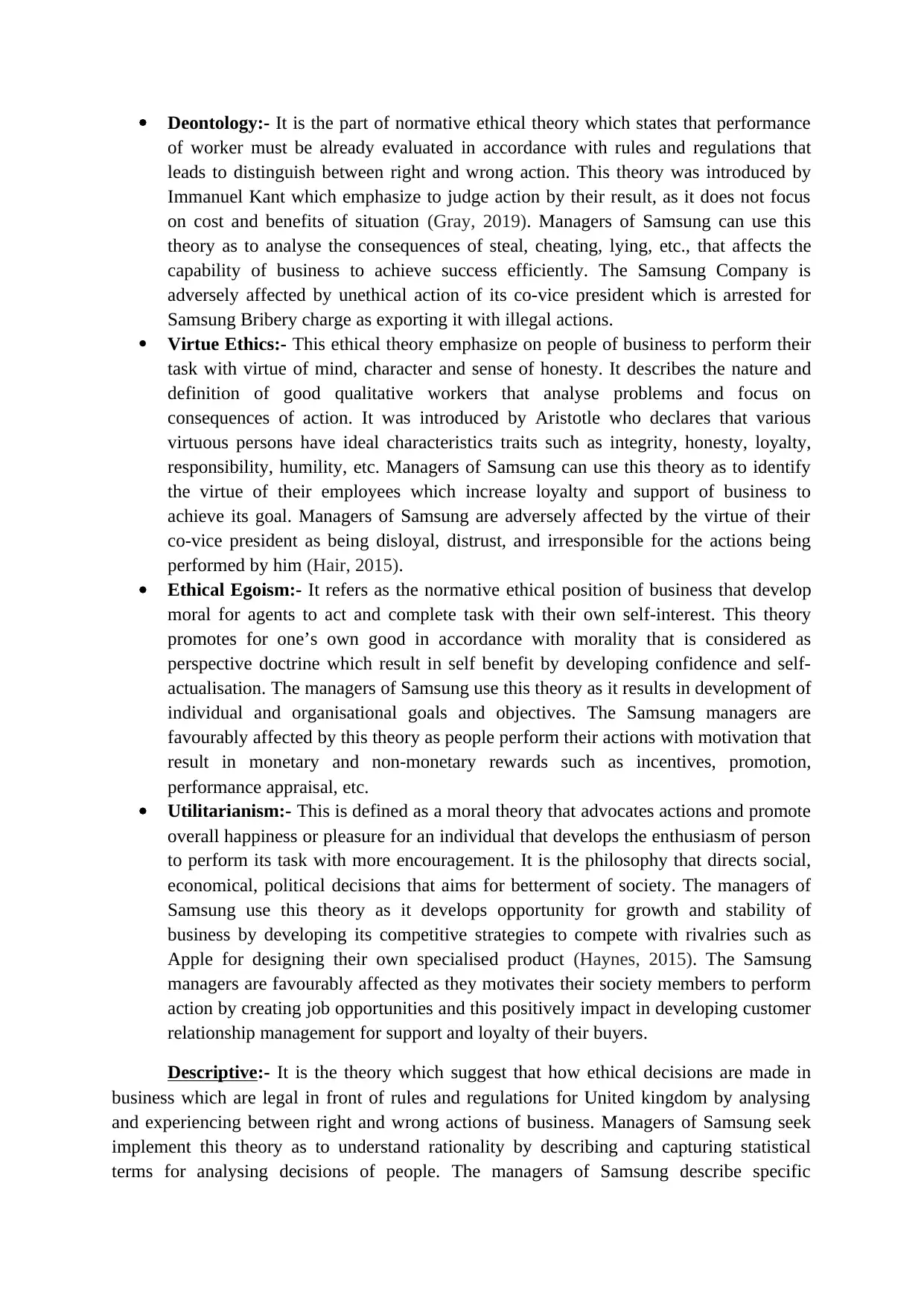
Deontology:- It is the part of normative ethical theory which states that performance
of worker must be already evaluated in accordance with rules and regulations that
leads to distinguish between right and wrong action. This theory was introduced by
Immanuel Kant which emphasize to judge action by their result, as it does not focus
on cost and benefits of situation (Gray, 2019). Managers of Samsung can use this
theory as to analyse the consequences of steal, cheating, lying, etc., that affects the
capability of business to achieve success efficiently. The Samsung Company is
adversely affected by unethical action of its co-vice president which is arrested for
Samsung Bribery charge as exporting it with illegal actions.
Virtue Ethics:- This ethical theory emphasize on people of business to perform their
task with virtue of mind, character and sense of honesty. It describes the nature and
definition of good qualitative workers that analyse problems and focus on
consequences of action. It was introduced by Aristotle who declares that various
virtuous persons have ideal characteristics traits such as integrity, honesty, loyalty,
responsibility, humility, etc. Managers of Samsung can use this theory as to identify
the virtue of their employees which increase loyalty and support of business to
achieve its goal. Managers of Samsung are adversely affected by the virtue of their
co-vice president as being disloyal, distrust, and irresponsible for the actions being
performed by him (Hair, 2015).
Ethical Egoism:- It refers as the normative ethical position of business that develop
moral for agents to act and complete task with their own self-interest. This theory
promotes for one’s own good in accordance with morality that is considered as
perspective doctrine which result in self benefit by developing confidence and self-
actualisation. The managers of Samsung use this theory as it results in development of
individual and organisational goals and objectives. The Samsung managers are
favourably affected by this theory as people perform their actions with motivation that
result in monetary and non-monetary rewards such as incentives, promotion,
performance appraisal, etc.
Utilitarianism:- This is defined as a moral theory that advocates actions and promote
overall happiness or pleasure for an individual that develops the enthusiasm of person
to perform its task with more encouragement. It is the philosophy that directs social,
economical, political decisions that aims for betterment of society. The managers of
Samsung use this theory as it develops opportunity for growth and stability of
business by developing its competitive strategies to compete with rivalries such as
Apple for designing their own specialised product (Haynes, 2015). The Samsung
managers are favourably affected as they motivates their society members to perform
action by creating job opportunities and this positively impact in developing customer
relationship management for support and loyalty of their buyers.
Descriptive:- It is the theory which suggest that how ethical decisions are made in
business which are legal in front of rules and regulations for United kingdom by analysing
and experiencing between right and wrong actions of business. Managers of Samsung seek
implement this theory as to understand rationality by describing and capturing statistical
terms for analysing decisions of people. The managers of Samsung describe specific
of worker must be already evaluated in accordance with rules and regulations that
leads to distinguish between right and wrong action. This theory was introduced by
Immanuel Kant which emphasize to judge action by their result, as it does not focus
on cost and benefits of situation (Gray, 2019). Managers of Samsung can use this
theory as to analyse the consequences of steal, cheating, lying, etc., that affects the
capability of business to achieve success efficiently. The Samsung Company is
adversely affected by unethical action of its co-vice president which is arrested for
Samsung Bribery charge as exporting it with illegal actions.
Virtue Ethics:- This ethical theory emphasize on people of business to perform their
task with virtue of mind, character and sense of honesty. It describes the nature and
definition of good qualitative workers that analyse problems and focus on
consequences of action. It was introduced by Aristotle who declares that various
virtuous persons have ideal characteristics traits such as integrity, honesty, loyalty,
responsibility, humility, etc. Managers of Samsung can use this theory as to identify
the virtue of their employees which increase loyalty and support of business to
achieve its goal. Managers of Samsung are adversely affected by the virtue of their
co-vice president as being disloyal, distrust, and irresponsible for the actions being
performed by him (Hair, 2015).
Ethical Egoism:- It refers as the normative ethical position of business that develop
moral for agents to act and complete task with their own self-interest. This theory
promotes for one’s own good in accordance with morality that is considered as
perspective doctrine which result in self benefit by developing confidence and self-
actualisation. The managers of Samsung use this theory as it results in development of
individual and organisational goals and objectives. The Samsung managers are
favourably affected by this theory as people perform their actions with motivation that
result in monetary and non-monetary rewards such as incentives, promotion,
performance appraisal, etc.
Utilitarianism:- This is defined as a moral theory that advocates actions and promote
overall happiness or pleasure for an individual that develops the enthusiasm of person
to perform its task with more encouragement. It is the philosophy that directs social,
economical, political decisions that aims for betterment of society. The managers of
Samsung use this theory as it develops opportunity for growth and stability of
business by developing its competitive strategies to compete with rivalries such as
Apple for designing their own specialised product (Haynes, 2015). The Samsung
managers are favourably affected as they motivates their society members to perform
action by creating job opportunities and this positively impact in developing customer
relationship management for support and loyalty of their buyers.
Descriptive:- It is the theory which suggest that how ethical decisions are made in
business which are legal in front of rules and regulations for United kingdom by analysing
and experiencing between right and wrong actions of business. Managers of Samsung seek
implement this theory as to understand rationality by describing and capturing statistical
terms for analysing decisions of people. The managers of Samsung describe specific
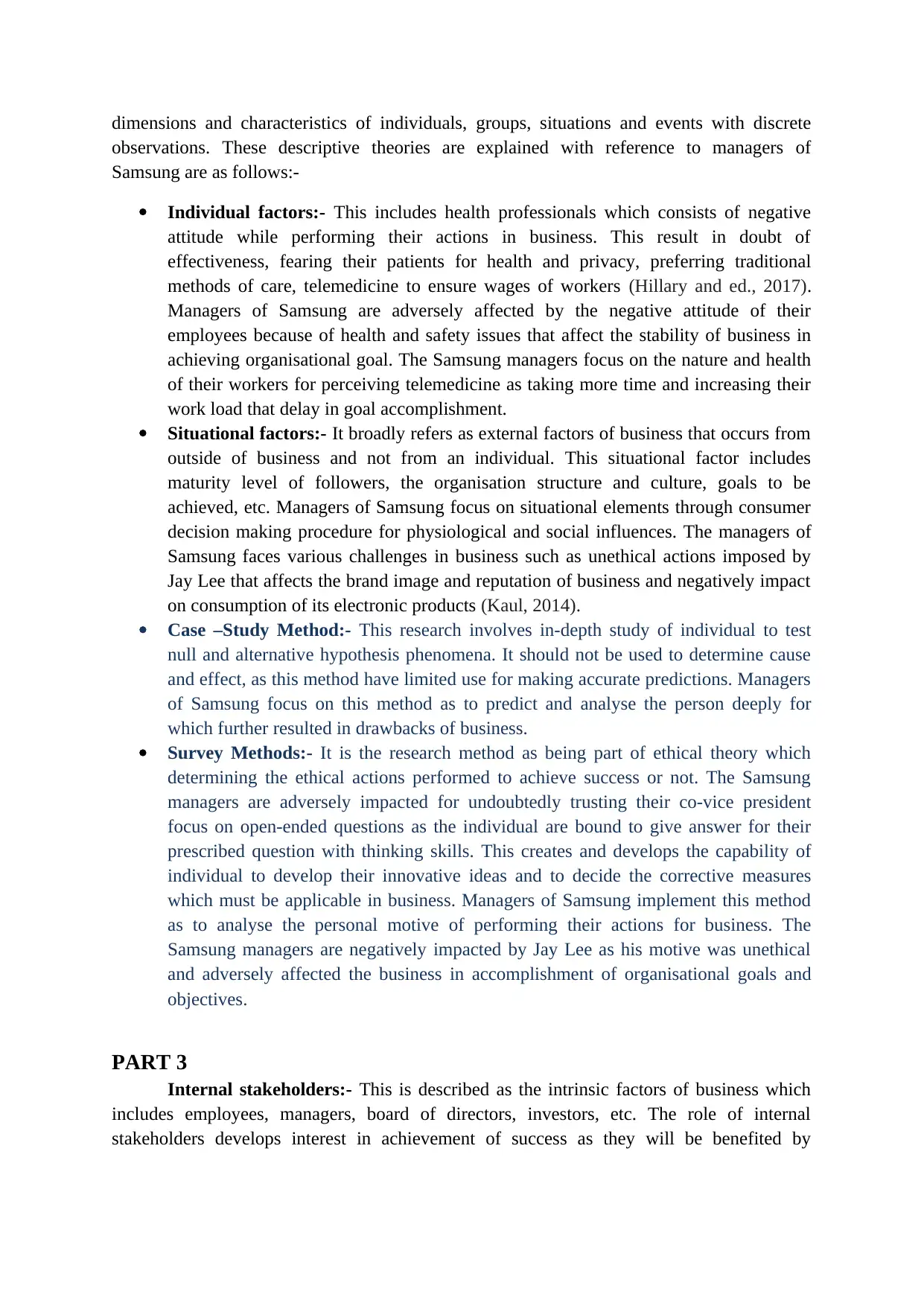
dimensions and characteristics of individuals, groups, situations and events with discrete
observations. These descriptive theories are explained with reference to managers of
Samsung are as follows:-
Individual factors:- This includes health professionals which consists of negative
attitude while performing their actions in business. This result in doubt of
effectiveness, fearing their patients for health and privacy, preferring traditional
methods of care, telemedicine to ensure wages of workers (Hillary and ed., 2017).
Managers of Samsung are adversely affected by the negative attitude of their
employees because of health and safety issues that affect the stability of business in
achieving organisational goal. The Samsung managers focus on the nature and health
of their workers for perceiving telemedicine as taking more time and increasing their
work load that delay in goal accomplishment.
Situational factors:- It broadly refers as external factors of business that occurs from
outside of business and not from an individual. This situational factor includes
maturity level of followers, the organisation structure and culture, goals to be
achieved, etc. Managers of Samsung focus on situational elements through consumer
decision making procedure for physiological and social influences. The managers of
Samsung faces various challenges in business such as unethical actions imposed by
Jay Lee that affects the brand image and reputation of business and negatively impact
on consumption of its electronic products (Kaul, 2014).
Case –Study Method:- This research involves in-depth study of individual to test
null and alternative hypothesis phenomena. It should not be used to determine cause
and effect, as this method have limited use for making accurate predictions. Managers
of Samsung focus on this method as to predict and analyse the person deeply for
which further resulted in drawbacks of business.
Survey Methods:- It is the research method as being part of ethical theory which
determining the ethical actions performed to achieve success or not. The Samsung
managers are adversely impacted for undoubtedly trusting their co-vice president
focus on open-ended questions as the individual are bound to give answer for their
prescribed question with thinking skills. This creates and develops the capability of
individual to develop their innovative ideas and to decide the corrective measures
which must be applicable in business. Managers of Samsung implement this method
as to analyse the personal motive of performing their actions for business. The
Samsung managers are negatively impacted by Jay Lee as his motive was unethical
and adversely affected the business in accomplishment of organisational goals and
objectives.
PART 3
Internal stakeholders:- This is described as the intrinsic factors of business which
includes employees, managers, board of directors, investors, etc. The role of internal
stakeholders develops interest in achievement of success as they will be benefited by
observations. These descriptive theories are explained with reference to managers of
Samsung are as follows:-
Individual factors:- This includes health professionals which consists of negative
attitude while performing their actions in business. This result in doubt of
effectiveness, fearing their patients for health and privacy, preferring traditional
methods of care, telemedicine to ensure wages of workers (Hillary and ed., 2017).
Managers of Samsung are adversely affected by the negative attitude of their
employees because of health and safety issues that affect the stability of business in
achieving organisational goal. The Samsung managers focus on the nature and health
of their workers for perceiving telemedicine as taking more time and increasing their
work load that delay in goal accomplishment.
Situational factors:- It broadly refers as external factors of business that occurs from
outside of business and not from an individual. This situational factor includes
maturity level of followers, the organisation structure and culture, goals to be
achieved, etc. Managers of Samsung focus on situational elements through consumer
decision making procedure for physiological and social influences. The managers of
Samsung faces various challenges in business such as unethical actions imposed by
Jay Lee that affects the brand image and reputation of business and negatively impact
on consumption of its electronic products (Kaul, 2014).
Case –Study Method:- This research involves in-depth study of individual to test
null and alternative hypothesis phenomena. It should not be used to determine cause
and effect, as this method have limited use for making accurate predictions. Managers
of Samsung focus on this method as to predict and analyse the person deeply for
which further resulted in drawbacks of business.
Survey Methods:- It is the research method as being part of ethical theory which
determining the ethical actions performed to achieve success or not. The Samsung
managers are adversely impacted for undoubtedly trusting their co-vice president
focus on open-ended questions as the individual are bound to give answer for their
prescribed question with thinking skills. This creates and develops the capability of
individual to develop their innovative ideas and to decide the corrective measures
which must be applicable in business. Managers of Samsung implement this method
as to analyse the personal motive of performing their actions for business. The
Samsung managers are negatively impacted by Jay Lee as his motive was unethical
and adversely affected the business in accomplishment of organisational goals and
objectives.
PART 3
Internal stakeholders:- This is described as the intrinsic factors of business which
includes employees, managers, board of directors, investors, etc. The role of internal
stakeholders develops interest in achievement of success as they will be benefited by
Paraphrase This Document
Need a fresh take? Get an instant paraphrase of this document with our AI Paraphraser
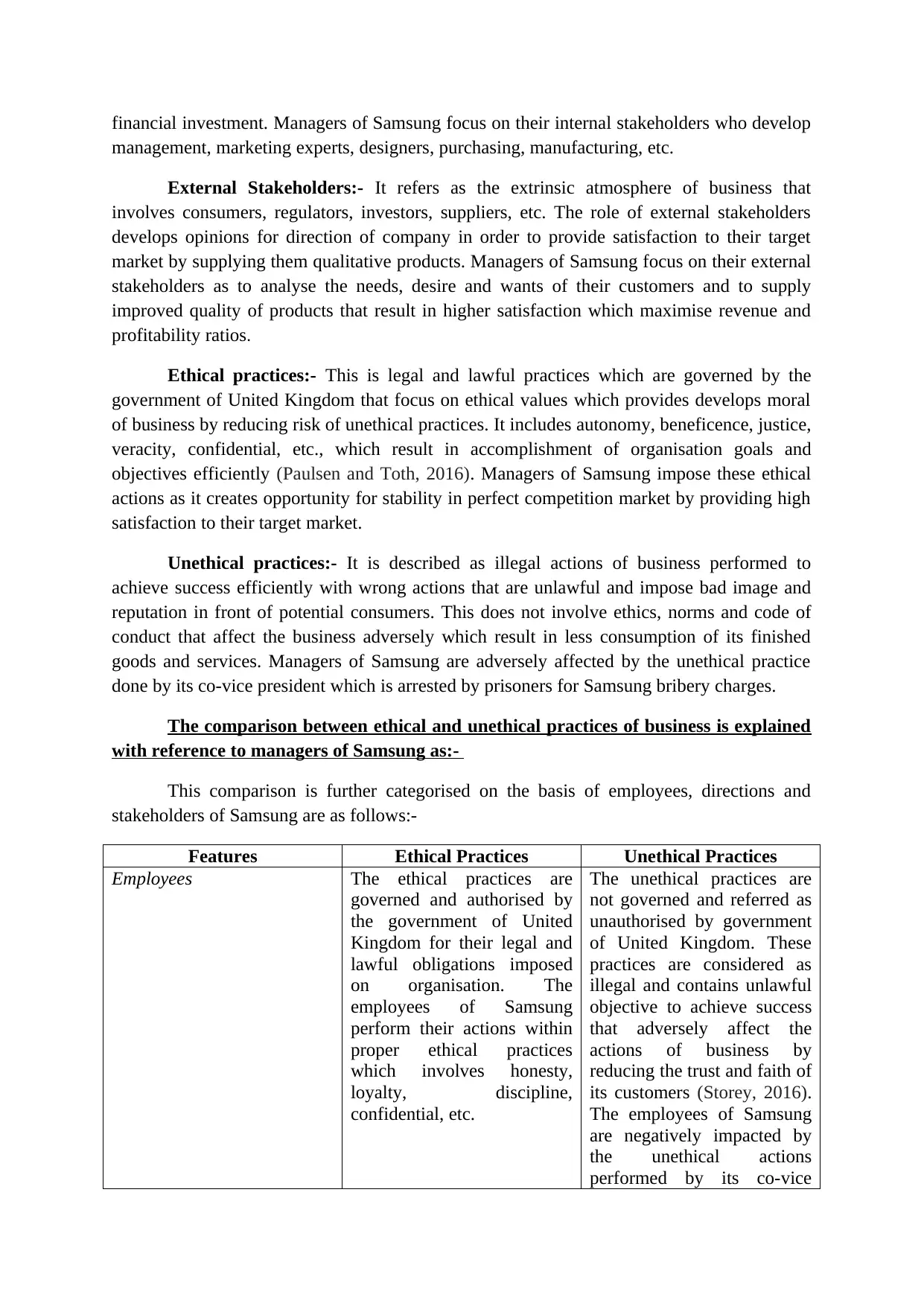
financial investment. Managers of Samsung focus on their internal stakeholders who develop
management, marketing experts, designers, purchasing, manufacturing, etc.
External Stakeholders:- It refers as the extrinsic atmosphere of business that
involves consumers, regulators, investors, suppliers, etc. The role of external stakeholders
develops opinions for direction of company in order to provide satisfaction to their target
market by supplying them qualitative products. Managers of Samsung focus on their external
stakeholders as to analyse the needs, desire and wants of their customers and to supply
improved quality of products that result in higher satisfaction which maximise revenue and
profitability ratios.
Ethical practices:- This is legal and lawful practices which are governed by the
government of United Kingdom that focus on ethical values which provides develops moral
of business by reducing risk of unethical practices. It includes autonomy, beneficence, justice,
veracity, confidential, etc., which result in accomplishment of organisation goals and
objectives efficiently (Paulsen and Toth, 2016). Managers of Samsung impose these ethical
actions as it creates opportunity for stability in perfect competition market by providing high
satisfaction to their target market.
Unethical practices:- It is described as illegal actions of business performed to
achieve success efficiently with wrong actions that are unlawful and impose bad image and
reputation in front of potential consumers. This does not involve ethics, norms and code of
conduct that affect the business adversely which result in less consumption of its finished
goods and services. Managers of Samsung are adversely affected by the unethical practice
done by its co-vice president which is arrested by prisoners for Samsung bribery charges.
The comparison between ethical and unethical practices of business is explained
with reference to managers of Samsung as:-
This comparison is further categorised on the basis of employees, directions and
stakeholders of Samsung are as follows:-
Features Ethical Practices Unethical Practices
Employees The ethical practices are
governed and authorised by
the government of United
Kingdom for their legal and
lawful obligations imposed
on organisation. The
employees of Samsung
perform their actions within
proper ethical practices
which involves honesty,
loyalty, discipline,
confidential, etc.
The unethical practices are
not governed and referred as
unauthorised by government
of United Kingdom. These
practices are considered as
illegal and contains unlawful
objective to achieve success
that adversely affect the
actions of business by
reducing the trust and faith of
its customers (Storey, 2016).
The employees of Samsung
are negatively impacted by
the unethical actions
performed by its co-vice
management, marketing experts, designers, purchasing, manufacturing, etc.
External Stakeholders:- It refers as the extrinsic atmosphere of business that
involves consumers, regulators, investors, suppliers, etc. The role of external stakeholders
develops opinions for direction of company in order to provide satisfaction to their target
market by supplying them qualitative products. Managers of Samsung focus on their external
stakeholders as to analyse the needs, desire and wants of their customers and to supply
improved quality of products that result in higher satisfaction which maximise revenue and
profitability ratios.
Ethical practices:- This is legal and lawful practices which are governed by the
government of United Kingdom that focus on ethical values which provides develops moral
of business by reducing risk of unethical practices. It includes autonomy, beneficence, justice,
veracity, confidential, etc., which result in accomplishment of organisation goals and
objectives efficiently (Paulsen and Toth, 2016). Managers of Samsung impose these ethical
actions as it creates opportunity for stability in perfect competition market by providing high
satisfaction to their target market.
Unethical practices:- It is described as illegal actions of business performed to
achieve success efficiently with wrong actions that are unlawful and impose bad image and
reputation in front of potential consumers. This does not involve ethics, norms and code of
conduct that affect the business adversely which result in less consumption of its finished
goods and services. Managers of Samsung are adversely affected by the unethical practice
done by its co-vice president which is arrested by prisoners for Samsung bribery charges.
The comparison between ethical and unethical practices of business is explained
with reference to managers of Samsung as:-
This comparison is further categorised on the basis of employees, directions and
stakeholders of Samsung are as follows:-
Features Ethical Practices Unethical Practices
Employees The ethical practices are
governed and authorised by
the government of United
Kingdom for their legal and
lawful obligations imposed
on organisation. The
employees of Samsung
perform their actions within
proper ethical practices
which involves honesty,
loyalty, discipline,
confidential, etc.
The unethical practices are
not governed and referred as
unauthorised by government
of United Kingdom. These
practices are considered as
illegal and contains unlawful
objective to achieve success
that adversely affect the
actions of business by
reducing the trust and faith of
its customers (Storey, 2016).
The employees of Samsung
are negatively impacted by
the unethical actions
performed by its co-vice
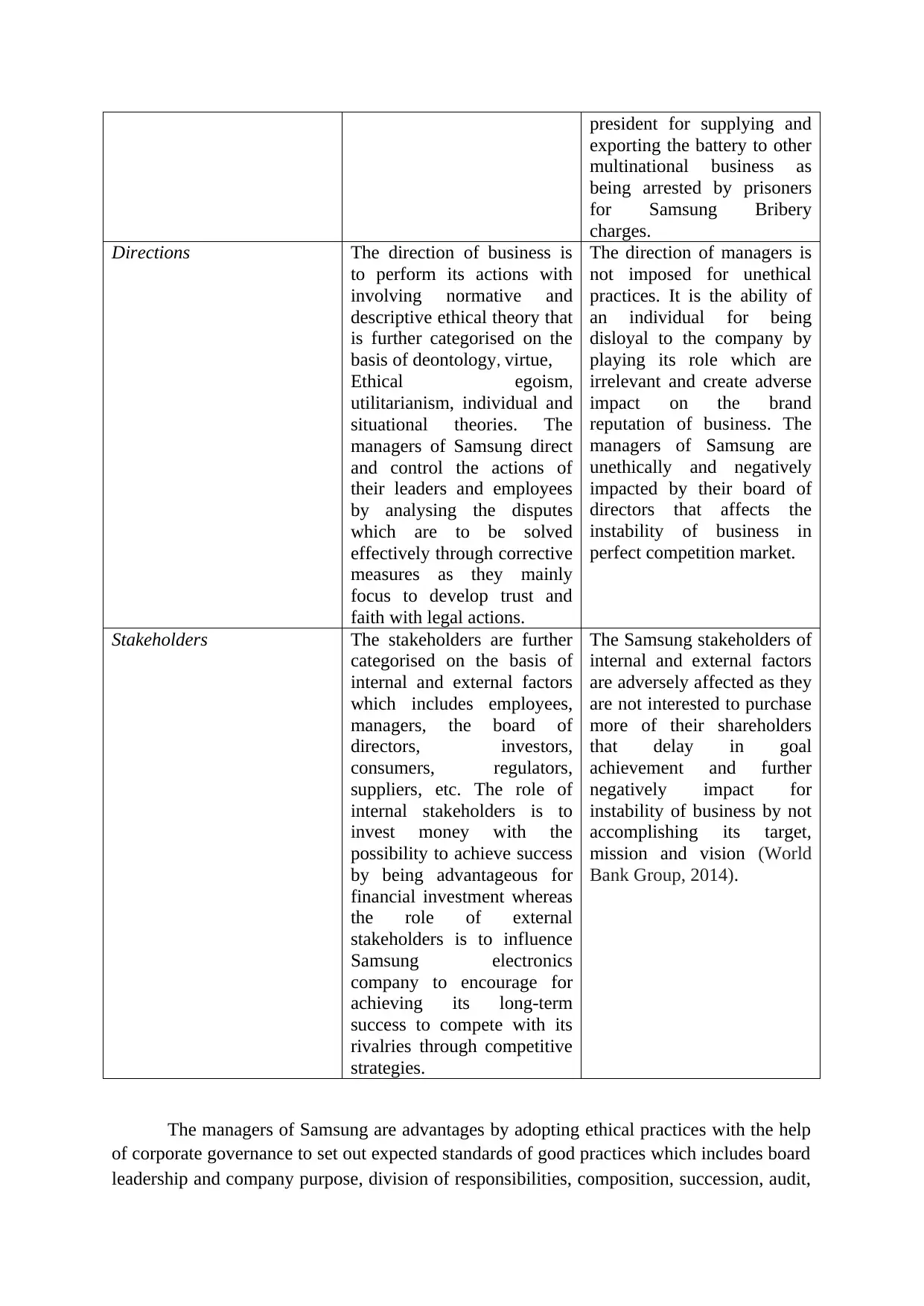
president for supplying and
exporting the battery to other
multinational business as
being arrested by prisoners
for Samsung Bribery
charges.
Directions The direction of business is
to perform its actions with
involving normative and
descriptive ethical theory that
is further categorised on the
basis of deontology, virtue,
Ethical egoism,
utilitarianism, individual and
situational theories. The
managers of Samsung direct
and control the actions of
their leaders and employees
by analysing the disputes
which are to be solved
effectively through corrective
measures as they mainly
focus to develop trust and
faith with legal actions.
The direction of managers is
not imposed for unethical
practices. It is the ability of
an individual for being
disloyal to the company by
playing its role which are
irrelevant and create adverse
impact on the brand
reputation of business. The
managers of Samsung are
unethically and negatively
impacted by their board of
directors that affects the
instability of business in
perfect competition market.
Stakeholders The stakeholders are further
categorised on the basis of
internal and external factors
which includes employees,
managers, the board of
directors, investors,
consumers, regulators,
suppliers, etc. The role of
internal stakeholders is to
invest money with the
possibility to achieve success
by being advantageous for
financial investment whereas
the role of external
stakeholders is to influence
Samsung electronics
company to encourage for
achieving its long-term
success to compete with its
rivalries through competitive
strategies.
The Samsung stakeholders of
internal and external factors
are adversely affected as they
are not interested to purchase
more of their shareholders
that delay in goal
achievement and further
negatively impact for
instability of business by not
accomplishing its target,
mission and vision (World
Bank Group, 2014).
The managers of Samsung are advantages by adopting ethical practices with the help
of corporate governance to set out expected standards of good practices which includes board
leadership and company purpose, division of responsibilities, composition, succession, audit,
exporting the battery to other
multinational business as
being arrested by prisoners
for Samsung Bribery
charges.
Directions The direction of business is
to perform its actions with
involving normative and
descriptive ethical theory that
is further categorised on the
basis of deontology, virtue,
Ethical egoism,
utilitarianism, individual and
situational theories. The
managers of Samsung direct
and control the actions of
their leaders and employees
by analysing the disputes
which are to be solved
effectively through corrective
measures as they mainly
focus to develop trust and
faith with legal actions.
The direction of managers is
not imposed for unethical
practices. It is the ability of
an individual for being
disloyal to the company by
playing its role which are
irrelevant and create adverse
impact on the brand
reputation of business. The
managers of Samsung are
unethically and negatively
impacted by their board of
directors that affects the
instability of business in
perfect competition market.
Stakeholders The stakeholders are further
categorised on the basis of
internal and external factors
which includes employees,
managers, the board of
directors, investors,
consumers, regulators,
suppliers, etc. The role of
internal stakeholders is to
invest money with the
possibility to achieve success
by being advantageous for
financial investment whereas
the role of external
stakeholders is to influence
Samsung electronics
company to encourage for
achieving its long-term
success to compete with its
rivalries through competitive
strategies.
The Samsung stakeholders of
internal and external factors
are adversely affected as they
are not interested to purchase
more of their shareholders
that delay in goal
achievement and further
negatively impact for
instability of business by not
accomplishing its target,
mission and vision (World
Bank Group, 2014).
The managers of Samsung are advantages by adopting ethical practices with the help
of corporate governance to set out expected standards of good practices which includes board
leadership and company purpose, division of responsibilities, composition, succession, audit,
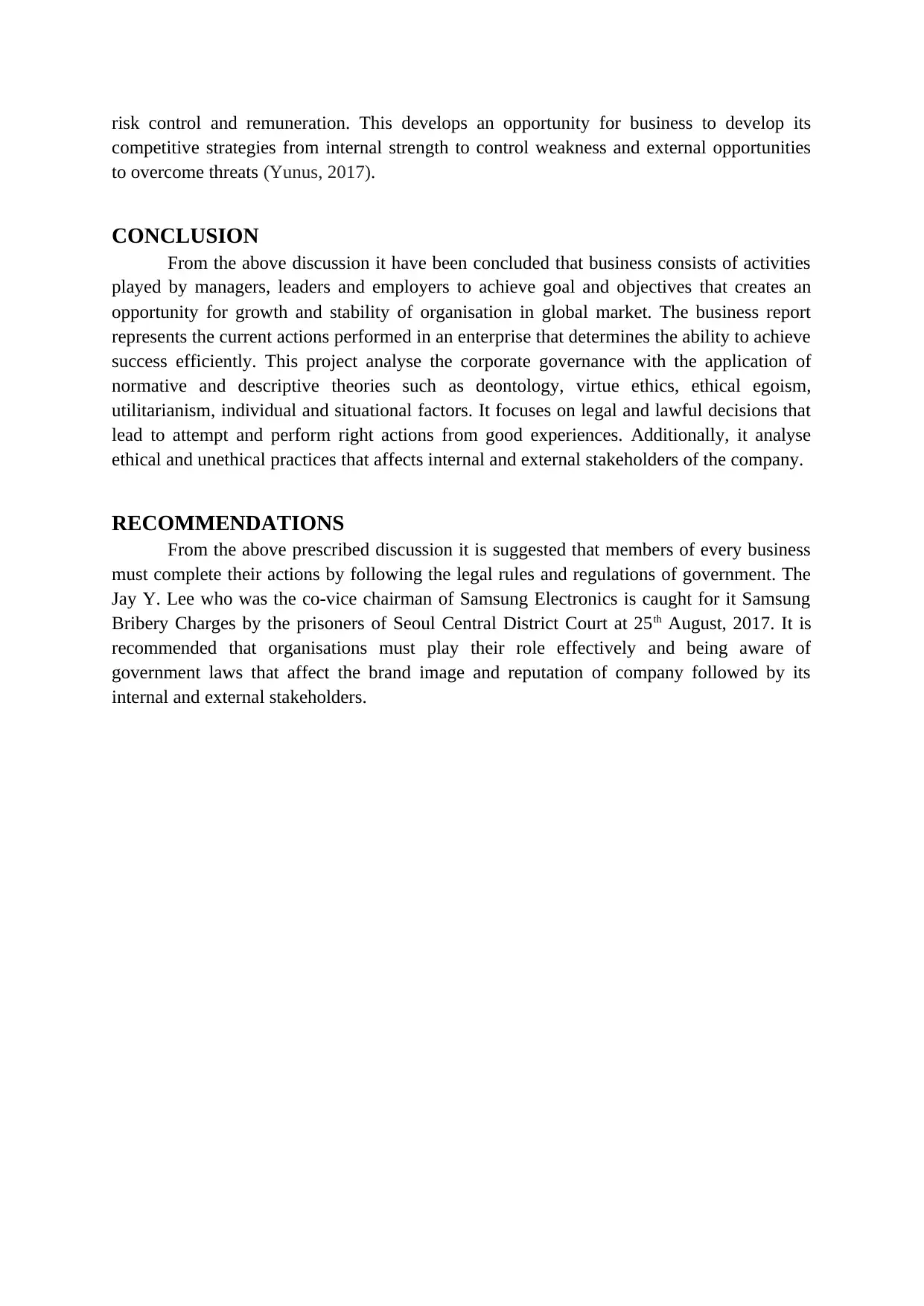
risk control and remuneration. This develops an opportunity for business to develop its
competitive strategies from internal strength to control weakness and external opportunities
to overcome threats (Yunus, 2017).
CONCLUSION
From the above discussion it have been concluded that business consists of activities
played by managers, leaders and employers to achieve goal and objectives that creates an
opportunity for growth and stability of organisation in global market. The business report
represents the current actions performed in an enterprise that determines the ability to achieve
success efficiently. This project analyse the corporate governance with the application of
normative and descriptive theories such as deontology, virtue ethics, ethical egoism,
utilitarianism, individual and situational factors. It focuses on legal and lawful decisions that
lead to attempt and perform right actions from good experiences. Additionally, it analyse
ethical and unethical practices that affects internal and external stakeholders of the company.
RECOMMENDATIONS
From the above prescribed discussion it is suggested that members of every business
must complete their actions by following the legal rules and regulations of government. The
Jay Y. Lee who was the co-vice chairman of Samsung Electronics is caught for it Samsung
Bribery Charges by the prisoners of Seoul Central District Court at 25th August, 2017. It is
recommended that organisations must play their role effectively and being aware of
government laws that affect the brand image and reputation of company followed by its
internal and external stakeholders.
competitive strategies from internal strength to control weakness and external opportunities
to overcome threats (Yunus, 2017).
CONCLUSION
From the above discussion it have been concluded that business consists of activities
played by managers, leaders and employers to achieve goal and objectives that creates an
opportunity for growth and stability of organisation in global market. The business report
represents the current actions performed in an enterprise that determines the ability to achieve
success efficiently. This project analyse the corporate governance with the application of
normative and descriptive theories such as deontology, virtue ethics, ethical egoism,
utilitarianism, individual and situational factors. It focuses on legal and lawful decisions that
lead to attempt and perform right actions from good experiences. Additionally, it analyse
ethical and unethical practices that affects internal and external stakeholders of the company.
RECOMMENDATIONS
From the above prescribed discussion it is suggested that members of every business
must complete their actions by following the legal rules and regulations of government. The
Jay Y. Lee who was the co-vice chairman of Samsung Electronics is caught for it Samsung
Bribery Charges by the prisoners of Seoul Central District Court at 25th August, 2017. It is
recommended that organisations must play their role effectively and being aware of
government laws that affect the brand image and reputation of company followed by its
internal and external stakeholders.
Secure Best Marks with AI Grader
Need help grading? Try our AI Grader for instant feedback on your assignments.
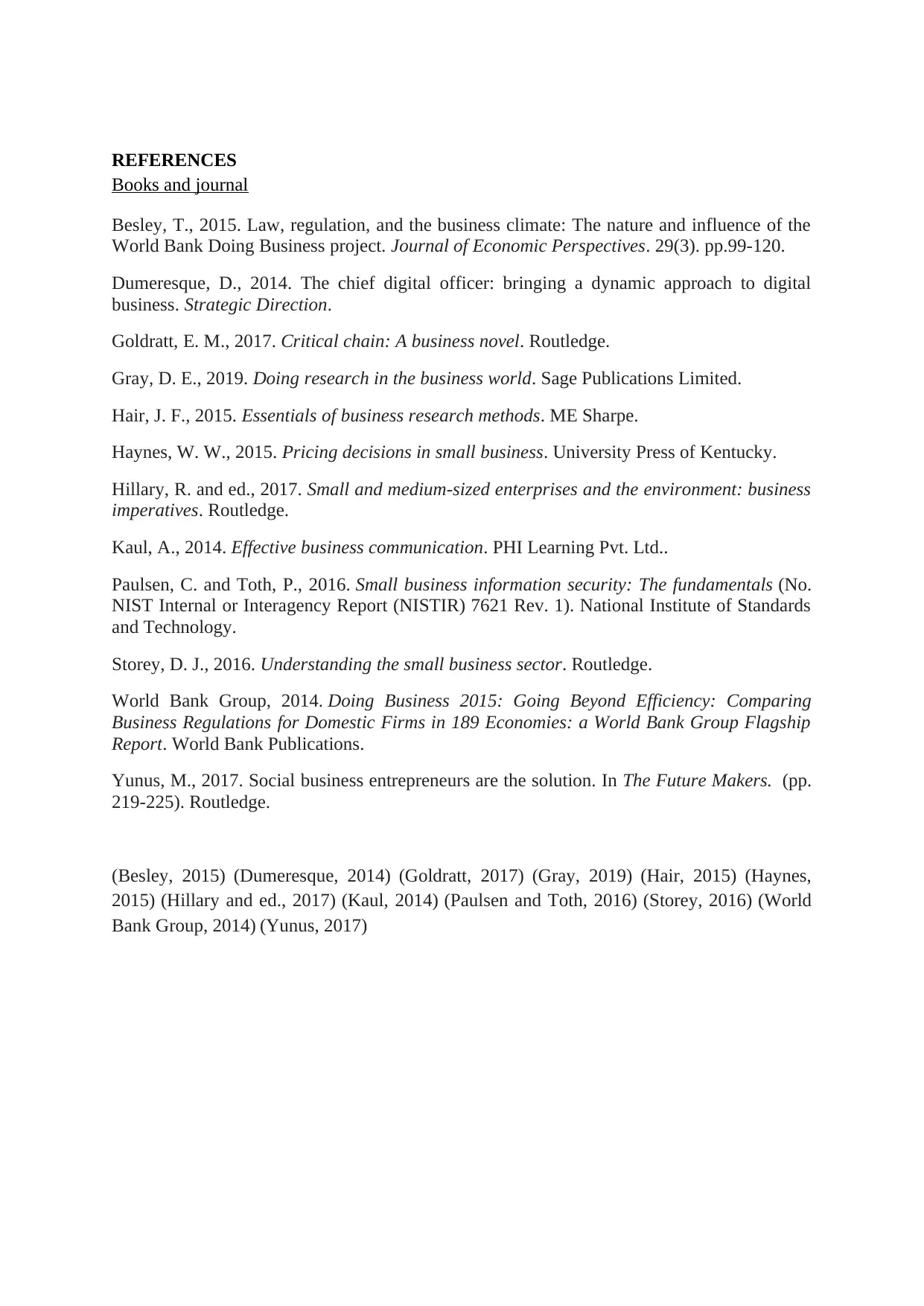
REFERENCES
Books and journal
Besley, T., 2015. Law, regulation, and the business climate: The nature and influence of the
World Bank Doing Business project. Journal of Economic Perspectives. 29(3). pp.99-120.
Dumeresque, D., 2014. The chief digital officer: bringing a dynamic approach to digital
business. Strategic Direction.
Goldratt, E. M., 2017. Critical chain: A business novel. Routledge.
Gray, D. E., 2019. Doing research in the business world. Sage Publications Limited.
Hair, J. F., 2015. Essentials of business research methods. ME Sharpe.
Haynes, W. W., 2015. Pricing decisions in small business. University Press of Kentucky.
Hillary, R. and ed., 2017. Small and medium-sized enterprises and the environment: business
imperatives. Routledge.
Kaul, A., 2014. Effective business communication. PHI Learning Pvt. Ltd..
Paulsen, C. and Toth, P., 2016. Small business information security: The fundamentals (No.
NIST Internal or Interagency Report (NISTIR) 7621 Rev. 1). National Institute of Standards
and Technology.
Storey, D. J., 2016. Understanding the small business sector. Routledge.
World Bank Group, 2014. Doing Business 2015: Going Beyond Efficiency: Comparing
Business Regulations for Domestic Firms in 189 Economies: a World Bank Group Flagship
Report. World Bank Publications.
Yunus, M., 2017. Social business entrepreneurs are the solution. In The Future Makers. (pp.
219-225). Routledge.
(Besley, 2015) (Dumeresque, 2014) (Goldratt, 2017) (Gray, 2019) (Hair, 2015) (Haynes,
2015) (Hillary and ed., 2017) (Kaul, 2014) (Paulsen and Toth, 2016) (Storey, 2016) (World
Bank Group, 2014) (Yunus, 2017)
Books and journal
Besley, T., 2015. Law, regulation, and the business climate: The nature and influence of the
World Bank Doing Business project. Journal of Economic Perspectives. 29(3). pp.99-120.
Dumeresque, D., 2014. The chief digital officer: bringing a dynamic approach to digital
business. Strategic Direction.
Goldratt, E. M., 2017. Critical chain: A business novel. Routledge.
Gray, D. E., 2019. Doing research in the business world. Sage Publications Limited.
Hair, J. F., 2015. Essentials of business research methods. ME Sharpe.
Haynes, W. W., 2015. Pricing decisions in small business. University Press of Kentucky.
Hillary, R. and ed., 2017. Small and medium-sized enterprises and the environment: business
imperatives. Routledge.
Kaul, A., 2014. Effective business communication. PHI Learning Pvt. Ltd..
Paulsen, C. and Toth, P., 2016. Small business information security: The fundamentals (No.
NIST Internal or Interagency Report (NISTIR) 7621 Rev. 1). National Institute of Standards
and Technology.
Storey, D. J., 2016. Understanding the small business sector. Routledge.
World Bank Group, 2014. Doing Business 2015: Going Beyond Efficiency: Comparing
Business Regulations for Domestic Firms in 189 Economies: a World Bank Group Flagship
Report. World Bank Publications.
Yunus, M., 2017. Social business entrepreneurs are the solution. In The Future Makers. (pp.
219-225). Routledge.
(Besley, 2015) (Dumeresque, 2014) (Goldratt, 2017) (Gray, 2019) (Hair, 2015) (Haynes,
2015) (Hillary and ed., 2017) (Kaul, 2014) (Paulsen and Toth, 2016) (Storey, 2016) (World
Bank Group, 2014) (Yunus, 2017)
1 out of 11
Your All-in-One AI-Powered Toolkit for Academic Success.
+13062052269
info@desklib.com
Available 24*7 on WhatsApp / Email
![[object Object]](/_next/static/media/star-bottom.7253800d.svg)
Unlock your academic potential
© 2024 | Zucol Services PVT LTD | All rights reserved.

